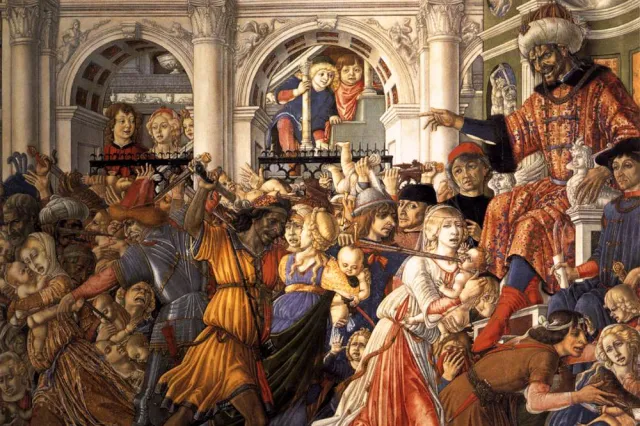The massacre of the Holy Innocents, because of a defenseless child, is a sign of fear of an unpredictable future. Even today, the unexpected has no place; the defenseless child always threatens established powers.
Furious and worried at the prospect of a power competing with his own, Herod massacred all children up to the age of two in Bethlehem and throughout its region. The evangelist composes his story with a much older analogous event in mind, that of the massacre of the children of the Hebrews by Pharaoh at the time of slavery in Egypt ( Mt 2:13-18 ). Jesus therefore immediately appears as the new Moses. He is this child who miraculously escapes death because God set him apart to free his people.
The quarrels to distinguish what, in Matthew’s account, is historically accurate from what is a theological reconstruction based on a well-known model are vain. Firstly because the story stutters. Without ever being an identical repetition, history regularly produces a succession of facts which are strangely reminiscent of other, more ancient ones. The evangelist only places the event in a larger story which helps to illuminate it and give it its full meaning. Moreover, the chronicles of the time tell that King Herod had three of his sons murdered in those years because he was so paranoid and jealous of his power, which makes Matthew’s story very plausible if not absolutely certain.
Herod was ready for anything
As it is, this Gospel story is striking for the disproportion between cause and effects: is an anonymous baby in a manger a threat to a king? And why massacre all children up to the age of two when it is a newborn just a few days old who is being targeted? This seemingly crazy act is actually very explainable. Here again, the chroniclers of the time provide us with information. Herod’s power was weak, dependent on the goodwill of the Roman occupier, left to quarrels between rival Jewish factions. Rumors of the coming of a messiah, even while still a child, could degenerate into riots and violence if the crowds took hold of them. This has also been verified several times during the recent history of the country. As for slaughtering all children up to the age of two, it is obviously monstrous and out of all proportion to the intended objective. But in Herod’s idea, such an order was to calm the possible ardor of the opponents of his power by showing them that he was ready for anything.
The weaker a power, the more violent it is, while true authority does not need to exercise violence to impose itself.
It is a classic of political history: the weaker a power, the more violent it is, while true authority does not need to exercise violence to impose itself. Jesus himself will demonstrate this when, years later, he justifies the fears that Herod had towards him by revealing himself as the expected Messiah. Because Jesus taught with authority, he never needed to resort to violence to assert himself.
Fear of the unexpected
However, we must go further in the meditation of this mystery of iniquity which is the massacre of the Holy Innocents. In reality, what frightens all political power in the child Jesus as in a crowd of innocent children, is the unpredictable, the uncalculable, what we cannot control. The child opens up an unforeseen future, and that is what is frightening. The technology and legislation of our time make it possible to exorcise this fear. The child only exists if it is desired, planned. If necessary, the technique will make it possible to compensate for deficiencies of a rebellious nature. If, on the contrary, the child is not wanted or planned, if it does not conform to the parents’ plan or the doctors’ requirements, the technique will be able to remedy this, at all stages of the process. The political authorities scrupulously ensure that this new fundamental right is applied. There is no place for the unexpected.
The child opens up an unforeseen future, of intertwined joys and sorrows. And when this child is God made flesh, this unforeseen event threatens all established powers. The song of the Magnificat which exults at the idea of God overthrowing the powerful from their thrones is still relevant today. The Gospel is revolutionary, not in the sense of political violence, but in the sense that it situates and relativizes all political powers by the mere presence of a defenseless child.
